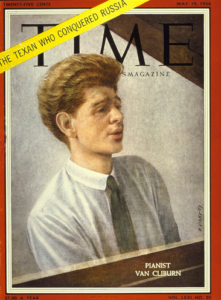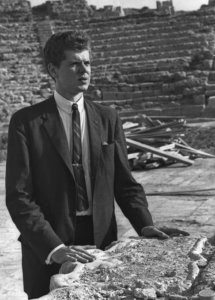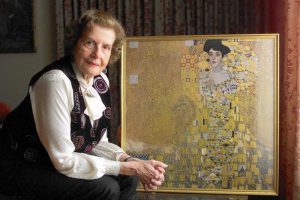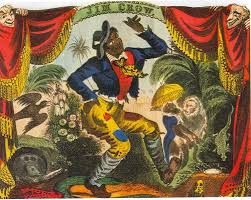In the year 1958, New York City was exploding with excitement. A parade drowned by cheers and with shredded paper was taking place down Broadway. An estimated 100,000 fans were cheering as a triumphant young musician with blonde hair and handsome looks waved in all directions to the crowds. Soon enough the world would know his name and he would be featured in all sorts of media, most memorably, in Times Magazine, where a portrait of him on the piano was set in print and titled “The Texan that Conquered Russia.” Earlier that year, against the backdrop of Cold War tensions, the stage was set for a showdown of talent and diplomacy at the 1958 Tchaikovsky Piano Competition in Moscow. Among the contenders worldwide, coming from countries all over the world, was Van Cliburn, a young American pianist from Texas.1

(…)
Some context is needed to understand the essence of this story. Following the defeat and dissolution of Nazi Germany in 1945, the world was freed from the prepotent Third Reich, which in less than a decade consolidated control all over Europe and, through a campaign of genocide and totalitarianism, killed off millions of Europeans through a system of executions and forced labor. Turning to East Asia and the Pacific lay the sight of a China devastated by Civil War and Southeast Asia and Pacific Islands endured horrifying submission from the also obliterated Japanese empire. There was a new global order gaining shape, one in which the United States and the Soviet Union were the dominant states, each with respective spheres of influence, and with strong cultural implications that would often transpose to the politics in the form of proxy wars, cultural wars, etc.2
By the time the 1950s came around, Soviets, even though they did not understand capitalism, “knew” all capitalists were the biggest threat to equality in the world, and the dream of a socialist utopia was newly brought to life by the death of Joseph Stalin and the rise of Khrushchev. Likewise, Americans, who did not necessarily understand socialism or communism, “knew” that the communists were the biggest threat to civilization and freedom that existed in the world. Anxieties grew on both sides with every alliance, and every technological feat the other side achieved, one of the crests of these anxieties being the launch of Sputnik in 1957, which made Americans anxiously speculate on the might of their own ballistic capability. Anxieties on both sides ran high and soon enough Americans were being arrested for being suspected to be communists. Amidst this turmoil Harvey Lavan Cliburn, who had just recently graduated college, would fly from his hometown in Kilgore, Texas to Moscow and enamor Russians with a performance that paralyzed the nation.3
(…)
His mother, Ryldia Bee O’Brian, had him at the age of thirty-seven with Harvey Lavan Cliburn, her husband, who passed down his name. However, his parents always saw to it that he was addressed as “Van.” Upon noticing Van’s ease in sounding the keyboard, his mother took it upon herself to see that he was coached and trained in classical music at the young age of three. She stressed always that from the moment Cliburn sat down at the piano downstairs, she was no longer his mother, but his tutor. Cliburn was kind and introverted but was raised to be generous and hard-working.4
By the time Cliburn turned seventeen, he earned a seat in Julliard. He was coached by a Russian pianist, Rosina Lhévinne, who had done work at the Moscow Imperial Conservatory and was addressed as Madame Lhevinne. She had to move to New York because of the unrest prompted by the Russian Revolution and WWI, and her technical brilliance and sophisticated emotional expression was enough for Cliburn to turn down a full ride at Columbia College to be coached by her. 5
The next three years were exciting and formative for Cliburn—not only did he win first place in the Leventritt Competition of 1954, a renowned classical music competition, but he also got to enjoy the sights and presence of contemporary talents in New York City while submitting himself to the disciplines of one of the most unique experiences music education in America could offer at the time. Personalities like Oscar Peterson, Ella Fitzgerald, and Art Tatum in Harlem had a pronounced presence in New York in those years, bringing their talents and musical ideas to the city. During the day, Van’s technique and clarity were sharpened until he could explore the keyboard without any difficulties, and at night he would witness monster improvizations firsthand that he would incorporate into his style. He grew his reputation at Julliard, which had 600 students at the time, and his friends at Columbia Management even set him up with an opportunity to tour Europe. He was uninterested, although he did have a major fascination for Russia, and its large Orthodox Churches.6
One day, brochures arrived in New York City about a new piano competition, and soon Van would not stop hearing about it; not only Madame Lhevinne but even Eugene Istomin, one of the members of the Leventritt jury, got ahold of Van, persuading him to attend. Left and right he would hear that he would win hands down if he entered, as Van was well acquainted with Russian pieces. This competition was unlike any other at the time; it was an international competition held in Moscow. Today, one of the most prestigious piano competitions in the world, Moscow hosted the first Tchaikovski piano competition in honor of the renowned Russian composer Pyotr Ilych Tchaikovski. Consisting of several rounds and a final round, requiring a demanding repertoire, a jury of the best music educators, performers, and experts assess interpretation, stage presence, and expressiveness, this competition was a chance for Van to make it big abroad, and after some deliberations (and fundraising), he made up his mind.7
March 22, 1958, Van boarded the plane to Moscow. He was not all that optimistic that he might win, especially with all the paranoia that ran around, but just getting to see Moscow was more than enough for him. The State Department even instructed Van’s team to meticulously document every sight, every interaction, and every receipt during his stay in the USSR. Upon having landed in Russia, Cliburn went through immigration and was eagerly examined by all who laid eyes upon him. Russians had never seen an American, yet there lay a rather charming blonde man. At first, it was functionaries at the airports and later it was the crowds who quickly found that they enjoyed Cliburn’s presence. Van would not have imagined that the kind chauffeur who drove him to his hotel, and the receptionists who greeted him at his hotel, were all reporting to the KGB.8
He engaged extensively with other contestants from all over the world and even played for them back and forth. He would see downtown Moscow and all the large churches, eat Russian food, and watch their sunsets. He was by all accounts a 23-year-old having the time of his life. As for the competition itself, there were four Americans and competitors, Argentina, Bulgaria, Canada, China, Czechoslovakia, Ecuador, France, Hungary, Israel, Japan, Mexico, Poland, Portugal, Romania, and West Germany. 9
The Jury was a formidable team of twelve judges from the Soviet bloc and five other judges from elsewhere. The rounds began shortly thereafter and from the moment Cliburn took to the piano, all his performances radiated with emotion and technical brilliance, earning him the admiration of Soviet audiences who watched him on television. It is difficult to convey with words just how much of a disarming charm Van Cliburn cast on the Russian people. Van was impossible to regard as the enemy Russians had been told Americans were; he was young, sincere, and clearly talented. Van’s deep love for Russian music combined with the delicacy and kindness that he carried himself with, and that was enough to quickly earn him the nickname “Vanya” (A diminutive of “Van”). And more than enough to make the United States ambassador very nervous that he might be a defector.10
Van felt the love from the public and would regularly become overwhelmed with the expectations, although not as much as they pertained to the potential political connotations of being a virtuous musician beating Russians at their very own competition, but the pressures of pleasing his fans. Van delivered amazing performances, and judges time and time again caught themselves jumping in, clapping, and even crying during one of Cliburn’s many standing ovations awarded by the public, while nervously thinking about what kind of payback they might receive if they denied their countrymen the award. This American had captivated the whole USSR through performances and many of the panelists affirmed that what they were witnessing was an authentically Russian performance. 11

The final round arrived, and Van stepped into the conservatory being greeted with an explosive applause, which was no coincidence. This was not the first time Van received a standing ovation. People knew who was behind the awarding committee—and he was sitting in the very room in balconies high above people; it was the recently elected Soviet premier Nikita Khrushchev. The Socialist Party was behind this competition and they understood how important it was for a Soviet to win. Speculation suggested this would occur regardless of the talents performing and where they came from. The public understood this and they were afraid Van might be denied the first prize. So, in response, they would not shy away from giving him fifteen minutes of spotlight, giving him flowers, instruments, and clothes to the point where Van would seem unsure of how to handle being smothered by the audience, but what he didn’t understand at the time was that it was a message to the jury and Krushchev 12
Finally, the thing between Cliburn and victory was delivering a performance of Rachmaninov’s piano concerto No. 2, which was a monstrous piece consisting of three parts, the last being notoriously emotional. After yet another flawless performance, Van released his hands from the piano. He immediately got up and kissed the band director on both cheeks, Russian style, and turned to the audience. The room exploded with emotion and reverence and in standing their ground, gave them a standing ovation lasting eight minutes 13
The jury was anxious about giving the first prize to an American and they turned to Khrushchev himself. Khrushchev went back and forth with the jury and figured that the crowds had indeed chosen their winner. Cliburn had just done what seemed impossible with something as simple as music: he touched into the souls of people through showsmanship and for a brief moment, brought east and west together through a message delivered through music. 14

would be sent to perform in other countries after his victory in Moscow | Courtesy of picryl
- Howard Reich, Van Cliburn (Nashville, TN: Thomas Nelson, 2008), 143-147. ↵
- John Lewis Gaddis, The Cold War: A New History (New York, NY: Penguin Books, 2006), 115-117. ↵
- John Lewis Gaddis, The Cold War: A New History (New York, NY: Penguin Books, 2006), 89-90. ↵
- Stuart Isacoff, When the World Stopped to Listen: Van Cliburn’s Cold War Triumph and its aftermath (New York, NY: Alfred A. Knopf, 2017), 12-21. ↵
- Howard Reich, Van Cliburn (Nashville, TN: Thomas Nelson, 2008), 40-43. ↵
- Howard Reich, Van Cliburn (Nashville, TN: Thomas Nelson, 2008), 44-48. ↵
- Nigel Cliff, Moscow Nights: The Van Cliburn Story-How One Man and His Piano Transformed the Cold War (New York: Harper Collins, 2017), 99-105. ↵
- Stuart Isacoff, When the World Stopped to Listen: Van Cliburn’s Cold War Triumph and its aftermath (New York, NY: Alfred A. Knopf, 2017), 206-207. ↵
- Howard Reich, Van Cliburn (Nashville, TN: Thomas Nelson, 2008), 133. ↵
- Nigel Cliff, Moscow Nights: The Van Cliburn Story-How One Man and His Piano Transformed the Cold War (New York: Harper Collins, 2017), 144-149. ↵
- Nigel Cliff, Moscow Nights: The Van Cliburn Story-How One Man and His Piano Transformed the Cold War (New York: Harper Collins, 2017), 155. ↵
- Stuart Isacoff, When the World Stopped to Listen: Van Cliburn’s Cold War Triumph and its aftermath (New York, NY: Alfred A. Knopf, 2017), 12-22. ↵
- Howard Reich, Van Cliburn (Nashville, TN: Thomas Nelson, 2008), 209-212. ↵
- Stuart Isacoff, When the World Stopped to Listen: Van Cliburn’s Cold War Triumph and its aftermath (New York, NY: Alfred A. Knopf, 2017), 148. ↵


